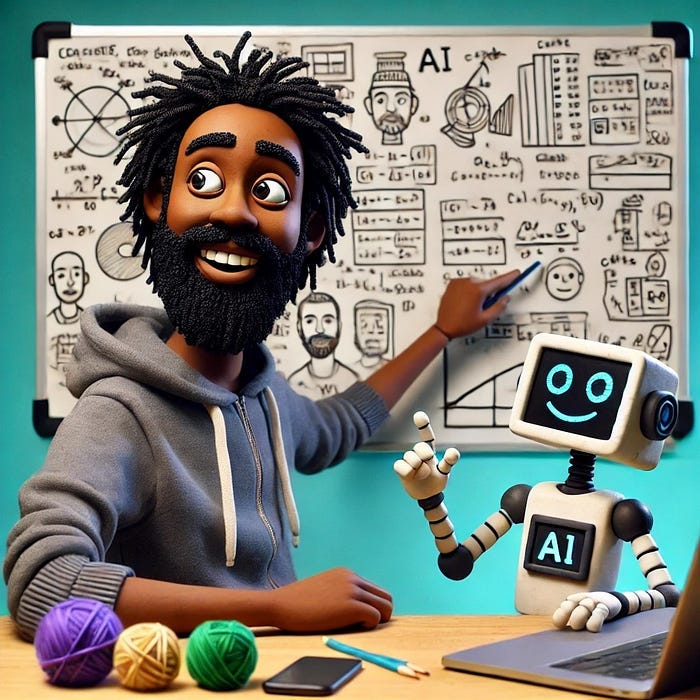Thoughts and Lessons From Interviewing For An Engineering Leadership Role in Late 2024
Interviewing in the age of AI.
Since the latest Tech Recession hit in 2022, we’ve all heard of the periodic layoffs happening for companies in an industry that we had come to believe was layoff-proof. I watched waves after waves happened, always being thankful that I was so far being spared. Well that streak ended on a morning of September 12th. When I saw the meeting request from my CEO, I knew what was up. As far as feelings, I was more surprised by the timing rather than the event itself, and as I mentioned in my LinkedIn post sharing the news, no hard feelings, in this current economy, whether you’re working at a startup or at a more established company, it can happen. It was time again to test the market after two and a half years. Now that I am in a better spot, I wanted to take a look back and share some of the things that I have learned as I interviewed over the past couple of months for various engineering leadership roles, with the majority of them being EMs level roles.
Your network is your net worth
Once I got over the initial surprise, I already knew that I was going to lean into my network to help me figure out my next move and posted on LinkedIn about what had happened and what I was looking for. I know some might feel ashamed or embarrassed to publicly announce that you’ve been laid off but it’s really something that you have no control over, so it is a good time to lean into the social capital that you might have amassed over the years of working with others. I was sincerely touched by the outpouring of support in the comments. No matter what, it still is something hard to go through and words of encouragement and sympathy do help. The outreach was both public and private and I want to take the time to sincerely help all that have spared a thought/cheer/call and helped in any capacity throughout. Here is a summary of the type of support I was lucky to receive during this period from my network:
Encouragements (comments, calls, messages and regular check-ins)
Linked Recommendations
Referrals and warm intros
The current opportunity I landed was a direct result of one of these referrals and most of the offers that I had were at the end of a process that started with a warm referral. Again, your network is your net worth, and my network came through for me big time and put in front of me some great opportunities that did not always work out for various reasons, but it gave me a sense of momentum.
AI is a great interviewing preparation partner
One thing that was different from my last round of interviewing (2022) is in the introduction of LLMs. This time around, it helped me greatly in a couple of different ways I’ll get into next.
First, I asked ChatGPT to help me review and update my resume, targeting for the type of roles I was looking for. This helped me refine my resume, and especially in adding my latest experience and finding a good way to express it in “resume” format. I could just basically talked about my achievements, and have the LLM translate it into a more appropriate “tech” speak. It took a few iterations but I was happy with were I landed after. Later in the process I also shelled out some money for Rezi, mainly because their ATS friendly resume format and other AI based resume review service proved quite valuable in helping me fine tune my resume. I used the “dreaded” Workday application system as a test ground for how ATS friendly my resume was. The previous format I used was pretty, but Workday was unable to properly parse it and I spent way more time than I liked fixing it post upload. After going with Rezi’s format, it picked up all the info almost perfectly.
Second, I used both Claude and ChatGPT to help me understand system design and distributed systems concepts that I previously struggled to understand. As an EM, most of the technical interviews I had to do were focused on System Design and I needed a refresher and used Educative.io excellent but massive (26h!!!) “Grokking the Modern System Design Interview” to review and it does a good job of walking you through the basics before composing into more advanced systems but as somebody that has spent most of my coding time on the FE, some of the concepts required a bit more time for me to grok. That’s where the LLMs came through, in really helping me understand the concept, speaking in terms I understand at my prompting. That was like having a personal tutor walk me through these problems and that’s a game changer in terms of preparation! Even on the front end, LLMs helped me refresh on React/Angular concepts and prepare the few coding rounds I had to go through. Having that extra level of feedback was both useful and validating. This is really one the more real and truly useful use cases for LLMs that I have had to experience in the past year.
EM Roles technical evaluations skew towards BE engineers’ experience
Unless the role is specifically FE focused, expect a lot of the interviewing process technical portions to lean more BE. System Design rounds test BE system design and if you don’t have enough exposure, it will make it more challenging. If you’re currently working, I’d recommend leaning into learning more about your current BE set up and challenges if you’re not already doing it. There is nothing like practical experience to help land some of the concepts you’ll run into when prepping for system design interviews. Ideally, it would make you even more well rounded to review your distributed systems knowledge on the job and get help from one of your engineers to help you understand how some of these concepts are leveraged in the application you’re responsible for. One silver lining though to this observation is that, at least for the companies I was interested in, the System Design round ended up being custom problem, helping design an in house approach to solving a real world problem. This made the exercise enjoyable as opposed to an abstract exercise in memorization and pattern matching that the typical interview can become nowadays. I had one memorable FE specific system design round that I particularly enjoyed that ended up sounding to me a good “talking shop” conversation between Senior+ engineers. This is a pattern I am hoping to see more of in the future.
Other observations
I’ll share here some other observations, or things that stood out to me, and the idea will be to expand more on it in some future articles.
Compensation: Expect overall compensation to be lower than pre 2022 crash.
There are more opportunities out there than I thought: Given the economic climate, and from anecdata, I was expecting it a be a long haul but it did not turn out that way in my experience, and I am hoping that it will be the same for all.
Unemployment: Unemployment insurance is a scam, at least in Maryland. The max weekly is 433 dollars, which is a tiny fraction of what would actually give me a living wage. I was grateful that I did not have to rely on it but it feels like you’re literally made to jump through hoops for something that you have paid into. Other states have it better, where you could claim up to 60% of your previous weekly wage but in Maryland, that weekly max would not take you very far.
Embrace rejection, it’s part of the journey. There is no way around it, it will happen, and for reasons outside of your controls sometimes. Interviewing sucks, everybody agrees, it’s like hitting a reset on your achievements and going out there and having to explain a validate them to a whole new set of people, again and again, and again. It will feel repetitive, sometimes thankless and yes you will be rejected at times but the way I see it, it’s part of the journey. Not all Yeses are good things, just like not all Nos are bad. You might have gotten a Yes for something you will have ended hating after.
You will be ghosted, sometimes for no reason. That’s one part of out of your control rejection I mentioned above. Do not take it personal. I was ghosted pre on site panels, post on site panels, it didn’t matter. It hurts most when you really liked the opportunity or thought you did well. The key here is to broaden your opportunities by applying more.
Job sites, YMMV: LinkedIn was terrible, but BuiltIn worked great for me. Your mileage might vary. I’ve heard the opposite from other folks
It’s a journey, take it easy on yourself: It’s an emotional rollercoaster, where you will feel down when things happen that are outside your control, like getting a rejection, or you will feel high but anxious, like when you’re getting offers but have to decide. And everything in between. If you’re lucky to be getting callbacks and interviews, apce yoursef. I spent the first 3 weeks in back to back interviews, hiring screens, and panels, all while prepping for coding and system design interviews. It’s high performance, and it is a lot. Our industry is unique that way. After 3 weeks I took a break and cut on the number of interviews, it helped that I had some offers on the table but I needed a break from the pressure as well. I realized that not everybody will have the same opportunity but even then, I still think that it is good for your mental health to step away, even if it is for a day to reset.
Don’t over-read people’s reactions and attitudes in interviews: I have had calls that I thought went bad that turned out great, and vice versa. Focus ultimately on the actual outcomes.
Last, I learned that adaptability wins. Be adaptable, tweak, iterate, but don’t give up. There are highs and lows but you have to create a momentum. I did many things during these times to improve my odds like tweaking my resume, trying different job sites, trying AI for interviewing prep and other things. Bring the same type of debugging mindset you bring to your job as an (former) engineer to your interviewing journey and be willing to test your own assumptions. If you’re going through interviewing right now, I hope this was helpful and gave you some perspective. There is light at the end of the tunnel and you will find it.



